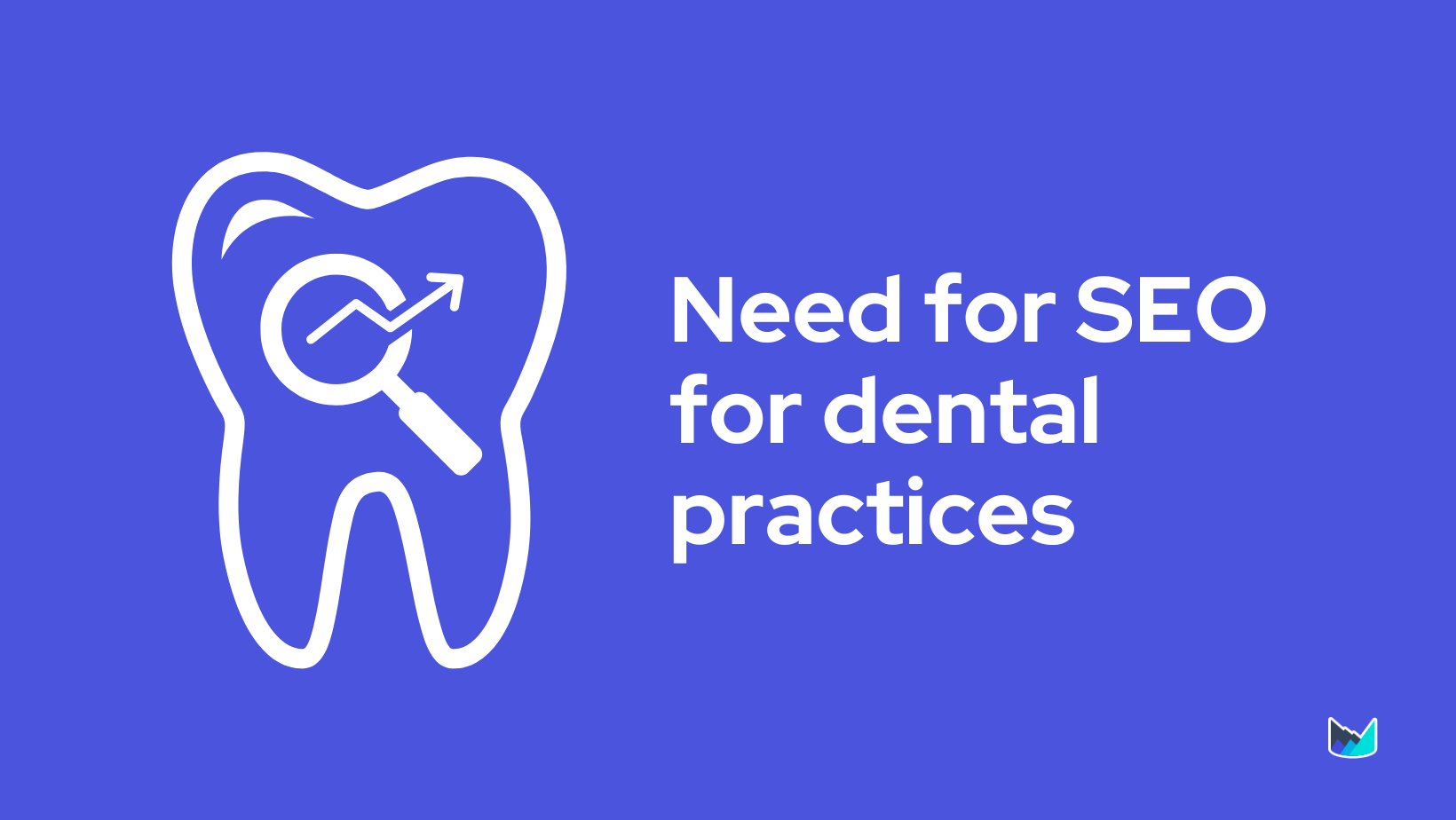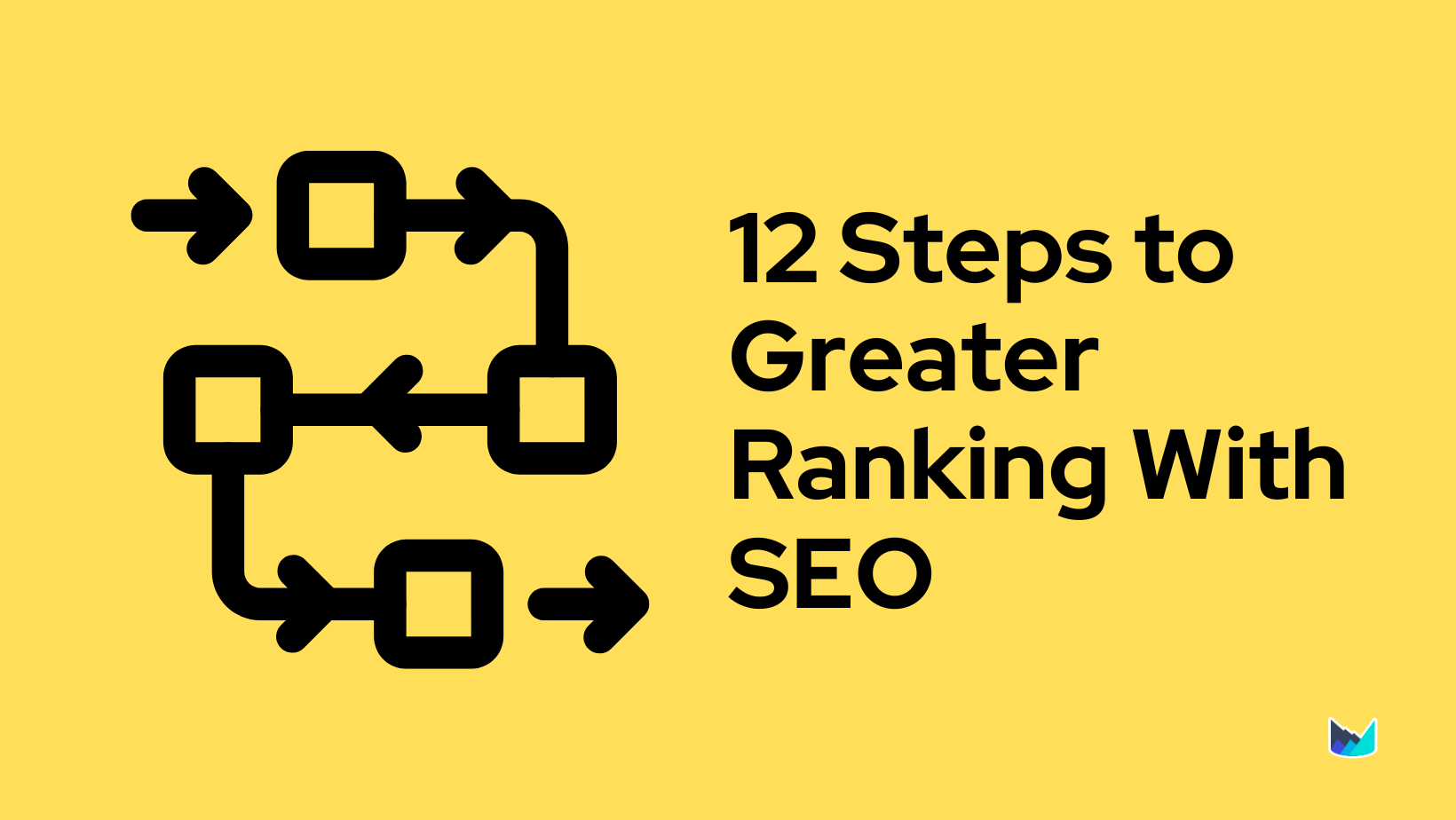- Product
- SEO Content Editor
- SEO Content Strategy
- Content Optimization
- Content Briefs
- AI Assisted Writing
- Keywords Clustering
Preview a demo walkthrough
Outranking the competition with our cutting-edge SEO strategies.
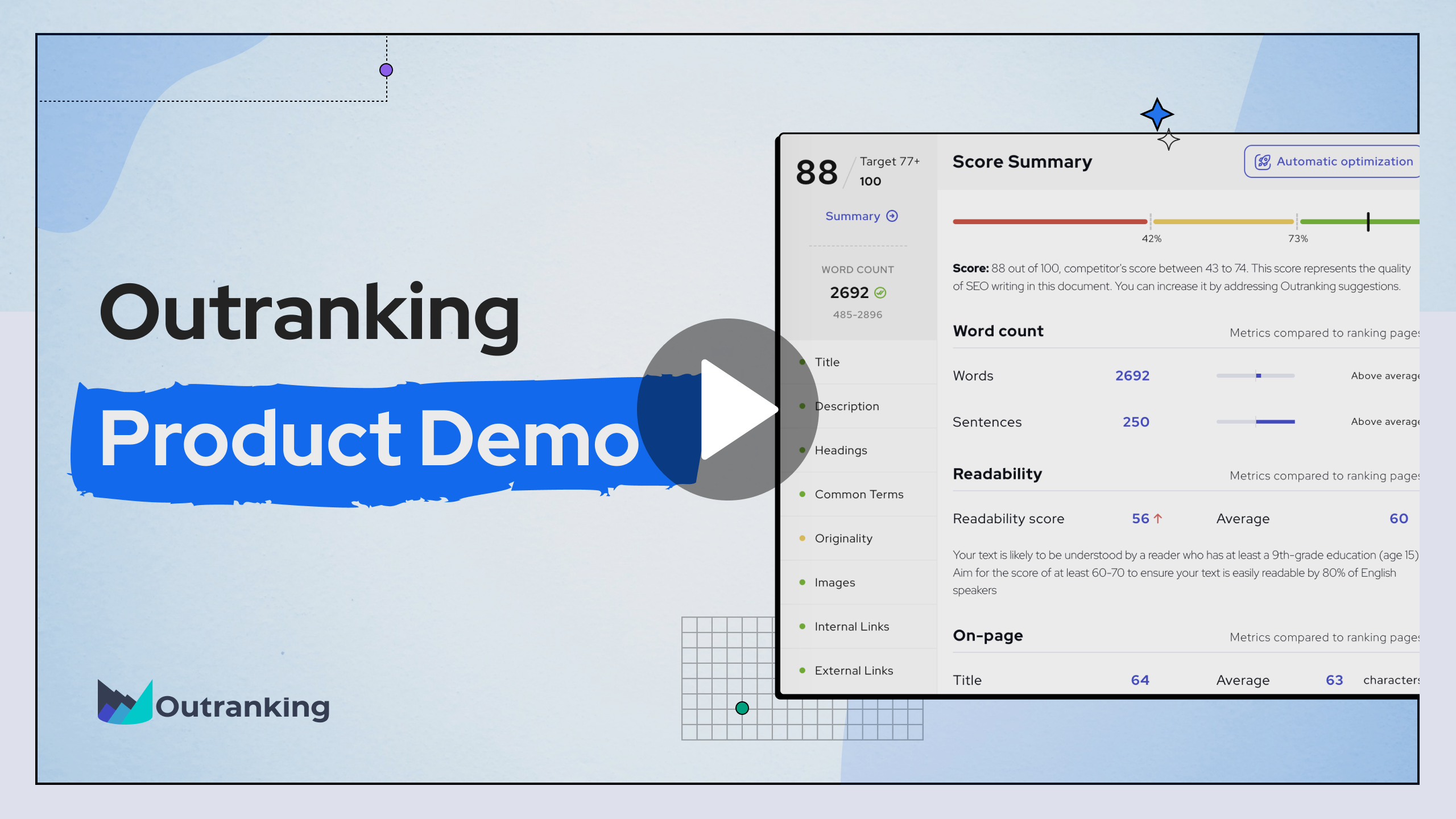
- Pricing
- Resources
- Sign In
- Get Started

Table of Contents
Are you a realtor struggling to attract clients to your website? Did you know that 95% of all online experiences begin with a search engine? This means that if your website isn’t optimized for search engines, you’re missing out on potential clients. But don’t worry, we’ve got you covered. In this blog post, we’ll be discussing the importance of real estate search engine optimization strategies and how they can help you attract more clients. We’ll also be sharing some effective strategies for building an SEO strategy that will help you rank higher in search engine results pages (SERPs) and get more clients. So, if you’re ready to take your real estate business to the next level, keep reading!
Table of Contents
Why is SEO important for Realtors and Estate Agents
In the highly competitive and saturated real estate niche industry, realtors or estate agents face numerous challenges in attracting and retaining clients. SEO involves optimizing your website and online content to rank higher in search engine results pages (SERPs) when relevant keywords are searched. In this context, SEO is essential for realtors and estate agents for the following reasons:
- Increased Online Visibility: SEO helps realtors and estate agents to increase their online visibility by optimizing their website and online content for relevant keywords. By ranking higher in SERPs, they can attract more website visitors who are actively seeking assistance in buying or selling properties. This increased online visibility can help realtors and estate agents to stand out from their competitors and improve their chances of acquiring new clients.
- Improved Client Acquisition: By creating helpful, informative content that is optimized for SEO, realtors, and estate agents can attract more website visitors who are interested in what they have to offer. What’s more, these visitors are more likely to convert into clients or customers. This is because they have already shown an interest in the services offered by the realtor or estate agent.
- Cost-Effective Marketing: SEO is a cost-effective marketing strategy for realtors and estate agents. Unlike traditional marketing methods such as print ads or billboards, SEO is relatively inexpensive and can deliver long-term results. By investing in SEO, realtors and estate agents can improve their online presence and attract more clients without breaking the bank.
- Measurable Results: SEO provides realtors and estate agents with measurable results. By tracking their website traffic and keyword rankings, they can see how their SEO efforts are impacting their online presence and client acquisition. This means they can allocate their time and resources more efficiently and improve their bottom line.
- Competitive Advantage: In a highly competitive industry like real estate, having a strong online presence can give realtors and estate agents a competitive advantage. By investing in SEO, they can improve their website’s ranking and attract more clients than their competitors. This can help them to establish themselves as industry leaders and improve their overall business success.
SEO KPIs for Realtors: How to Measure the Success of Your SEO Strategies
As a realtor, having a strong online presence is crucial to attract potential clients and grow your business. One of the most effective ways to achieve this is through search engine optimization (SEO). However, to measure the success of your SEO program, you need to set clear goals and key performance indicators (KPIs) that are relevant to your business needs. Some KPIs you could track include increased Google rankings, traffic, interactions with your Google My Business profile, and improved conversion rates.
- Client Booking: To ensure that interested clients can easily schedule appointments with you, make sure your website has a clear call-to-action and a user-friendly booking system. This will not only improve your SEO but also enhance the user experience.
- Appointments: Managing appointments efficiently are crucial to avoid missed opportunities. Make sure to respond promptly to appointment requests and follow up with clients to confirm appointments. This will not only improve your reputation but also increase the likelihood of converting leads into clients.
- Position in Google Business: To attract potential clients searching for real estate in your area, it’s essential to have a strong position in Google Business. This can be achieved by optimizing your Google My Business profile, including accurate and up-to-date information, high-quality images, and positive reviews. By focusing on these subheadings and tracking relevant KPIs, realtors can improve their SEO efforts and achieve their business goals.
How to implement SEO for Realtor and Estate Agent websites
Step 1: Create Website Architecture by Breaking the website into core services of your Realtor or Estate Agency
The first step to implementing better SEO for a real estate agency is understanding the business’s core areas. This involves identifying the key areas that connect most with the core offering of the business.
To break down the website architecture of a realtor or estate agent website into core offerings and its extended list of sub-areas, it is important to consider the different services offered by the agency. For example, a real estate agent may offer services such as property sales, property management, property rentals, and property valuation.
Here is an example of a table that lists the core service areas and its extended list of sub-areas for a real estate agency:
| Core Offering Areas | Extended List of Sub Areas |
| Property Sales | Residential property sales, Commercial property sales, Land sales, New development sales |
| Property Management | Residential property management, Commercial property management, Tenant screening, Lease agreements |
| Property Rentals | Residential property rentals, Commercial property rentals, Vacation rentals, Short-term rentals |
| Property Valuation | Residential property valuation, Commercial property valuation, Appraisals, Comparative market analysis |
Step 2: Make a List of Keywords That Align With the services your Realtor or Estate Agency offers
When performing keyword research, there are three key things to keep in mind:
- Gather the list of keywords in each of the core areas of your website.
- Exclude outdated or irrelevant keywords to focus on analyzing the most important ones more efficiently.
- Stay organized with one combined file for easier management.
To do keyword research for a realtor or estate agent website, we can use Semrush or Outranking. Here are the logical steps to gather the data:
Use Semrush:
- Start by identifying the core areas of your website. For example, property rentals.
- Plug in a relevant keyword for each core area, such as “Residential property rentals”, “Commercial property rentals,” and “Vacation rentals.”
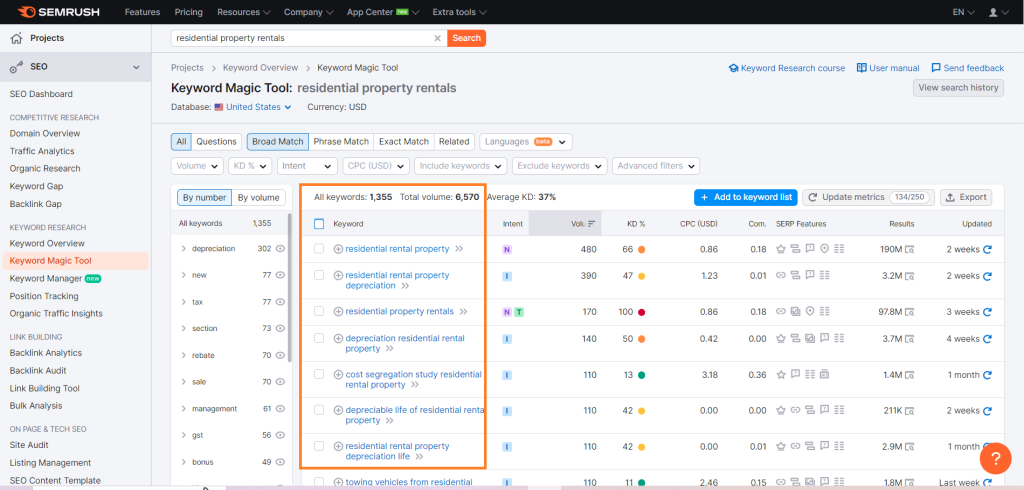
3. Exclude irrelevant or outdated keywords using the “exclude keywords” option.

4. Download the CSV file with the desired data using the Keyword Magic Tool.
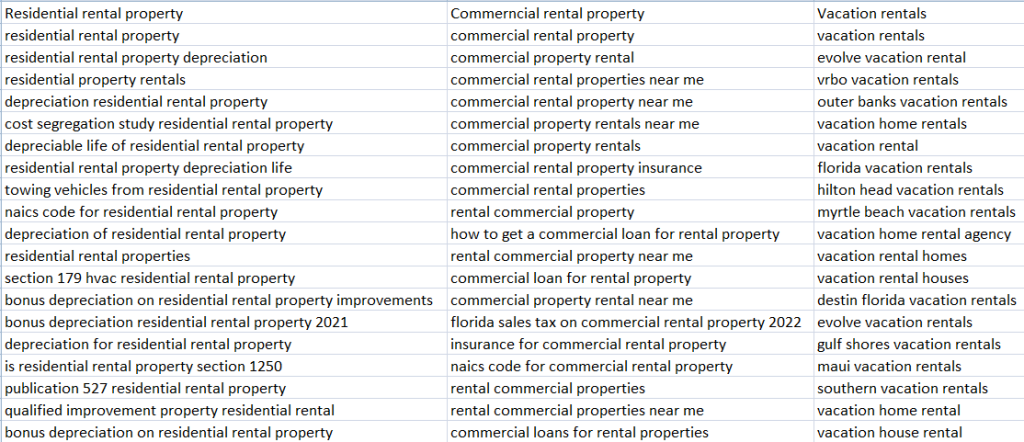
5. Repeat this process for each core area of your website.
6. Combine all the CSV files into one for easier management.
Step 3: Cluster Keywords in each service area to determine what topics to create
Keyword clustering is the process of grouping similar keywords into clusters based on their semantic terms and similar intent groups. A real estate agency website should use keyword clustering to improve its SEO content strategy by identifying the most relevant brand keywords for its business. Through keyword analysis, a real estate agency can identify the most popular search terms and create content that targets those keywords to increase its website’s visibility and attract potential clients. Creating high-quality content with targeted keywords can significantly increase the SEO value of your website and improve your search engine rankings.
For example, a sample realtor or estate agent keyword list could include keywords such as “buying a house,” “selling a house,” “real estate agent,” “home appraisal,” “mortgage rates,” and “property listings.” By using a tool like Outranking to cluster these keywords, real estate agents can identify groups of similar keywords, such as “buying a house” and “selling a house,” and “real estate agent” and “home appraisal.” This information can then be used to create targeted content for each group of keywords.

To pick the primary keyword for each group of clusters, the real estate agent should consider several factors, such as the difficulty of ranking for the keyword, the number of backlinks their competitors have, and their topical authority. By analyzing their competitors’ keyword coverage and minimum backlinks, real estate agents can identify opportunities to build their topical authority and select keywords that have a better chance of ranking high. They can also label keywords based on their difficulty in success to prioritize their content creation efforts.
It’s essential to hire someone who knows what they’re doing if the agency doesn’t have an in-house SEO team because keyword clustering requires expertise and experience to be done effectively.
Step 4: Create a Content Calendar and prioritize your Realtor or Estate Agent’s SEO efforts
To prioritize keywords for creating and optimizing content for a realtors or estate agents website, one can follow these steps:
- Identify primary keywords and groups: Start by identifying the primary keywords that are relevant to the real estate business. These can include keywords such as “real estate agent,” “homes for sale,” “property listings,” and so on. Group these keywords based on their relevance and similarity.
- Use a content planner: Once the primary keywords and groups have been identified, use a content planner to map out a plan and schedule for creating content. Outranking’s keyword “strategy topics and planner” page can be used to create a list of topics that can be used to create a content calendar.
- Prioritize the keywords: Prioritizing the keywords is crucial to ensure that the content created is relevant and effective. Outranking can help with prioritization by providing a priority-setting feature that allows users to set the priority of each keyword as high, medium, or low.
Step 5: Establish a Content Production Process, SOPs, and Content Briefs, Or Hire an Agency to help
For realtors or estate agents looking to implement SEO on their websites, it is important to have a well-defined process in place for creating and optimizing content. Here are three expert tips to ensure a thorough content creation and optimization process:
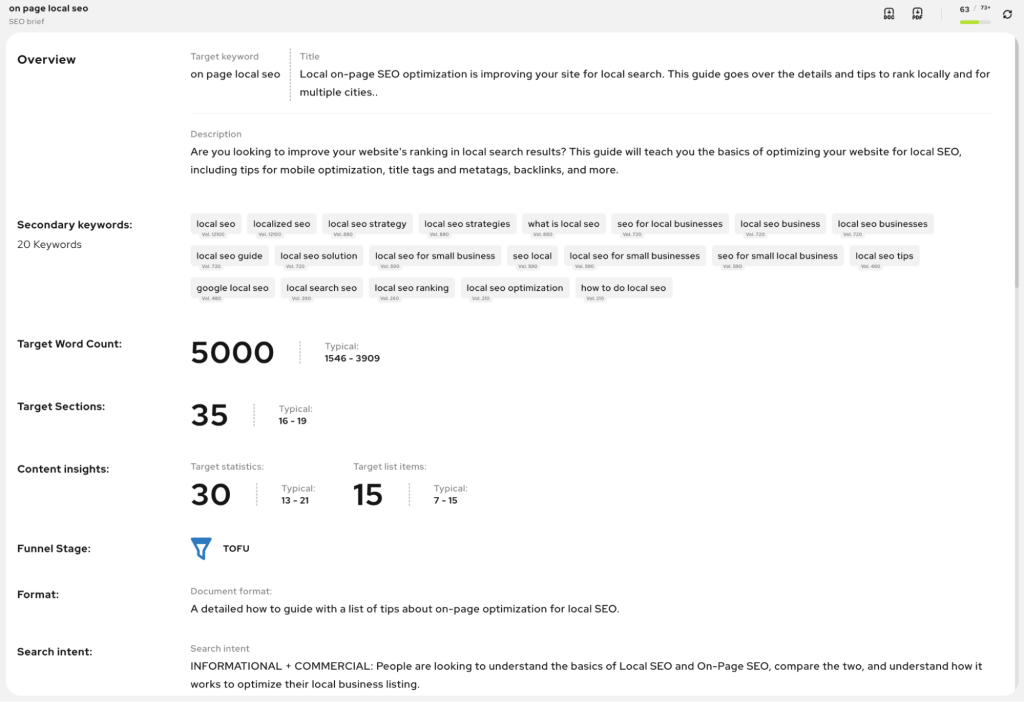
- Creating a solid content brief: Before creating any content, it is important to have a clear understanding of the target audience, keywords, and goals for each piece of content. Creating a content brief that outlines these details can help ensure that the content is on-target and effective.
- Setting up a proper content calendar: A content calendar can help keep track of deadlines, ensure a consistent publishing schedule, and help avoid any last-minute scrambling. It is important to plan ahead and create a schedule that allows for enough time to research, write, optimize, and publish each piece of content.
- Setting up an SEO workflow for tasks: Having a defined workflow for each task involved in the content creation and optimization process can help ensure that nothing is missed and that each step is completed efficiently. This can also help identify any bottlenecks or areas for improvement in the process.
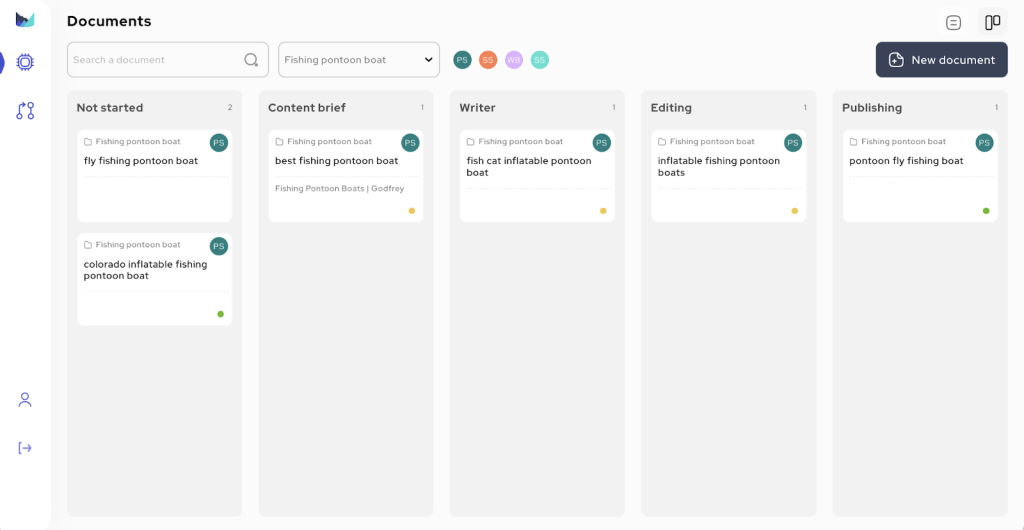
Using a content planner can be a great way to ensure the success of the plan. Outranking has predefined workflow status that can be customized to fit the needs of the realtor or estate agent’s business. The planner allows for easy tracking of every document with a customized workflow and provides a Kanban view to see the stage of each document at a glance.
Step 6: Create SEO-optimized content for service pages and blogs for your Realtor or Estate Agent website (or hire an agency)
Creating SEO-optimized content for each service page and blog is crucial for realtors or estate agents to ensure that their business is spending money on content that will yield results. By optimizing their content, they can increase their website’s organic reach, attract more potential clients, and ultimately generate more leads and sales.
However, busy real estate professionals may not have the time or expertise to create and optimize their content themselves. Hiring an agency, consultant, or freelancer can be a good option, but it can also be costly.
This is where SEO content optimization and writing platform can help. Outranking offers a wide range of features designed to help busy real estate professionals create and optimize their content quickly and easily. With real-time optimization benchmarks against 20 competing pages from SERPs, title tags and description optimization, outlines optimization, word count optimization, alt text, and more, Outranking can help real estate professionals ensure their content is optimized for the most important on-page SEO tips. A writing checker can be used to improve and optimize content better.
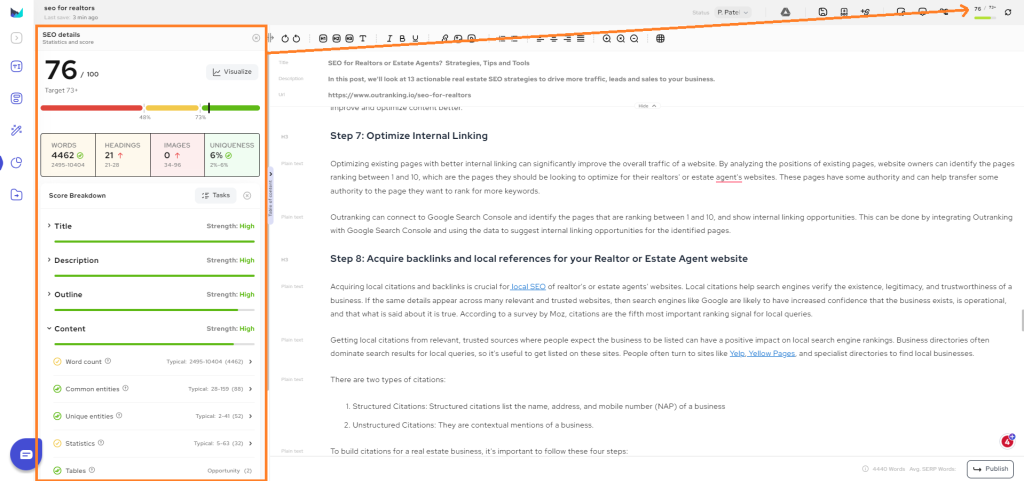
Step 7: Optimize Internal Linking
Optimizing existing pages with better internal linking can significantly improve the overall traffic of a website. By analyzing the positions of existing pages, website owners can identify the pages ranking between 1 and 10, which are the pages they should be looking to optimize for their realtors’ or estate agents’ websites. These pages have some authority and can help transfer some authority to the page they want to rank for more keywords.
Outranking can connect to Google Search Console and identify the pages that are ranking between 1 and 10, and show internal linking opportunities. This can be done by integrating Outranking with Google Search Console and using the data to suggest internal linking opportunities for the identified pages.
Step 8: Acquire backlinks and local references for your Realtor or Estate Agent website
Acquiring local citations and backlinks is crucial for local SEO of realtor’s or estate agents’ websites. Local citations help search engines verify the existence, legitimacy, and trustworthiness of a business. If the same details appear across many relevant and trusted websites, then search engines like Google are likely to have increased confidence that the business exists, is operational, and that what is said about it is true. According to a survey by Moz, citations are the fifth most important ranking signal for local queries.
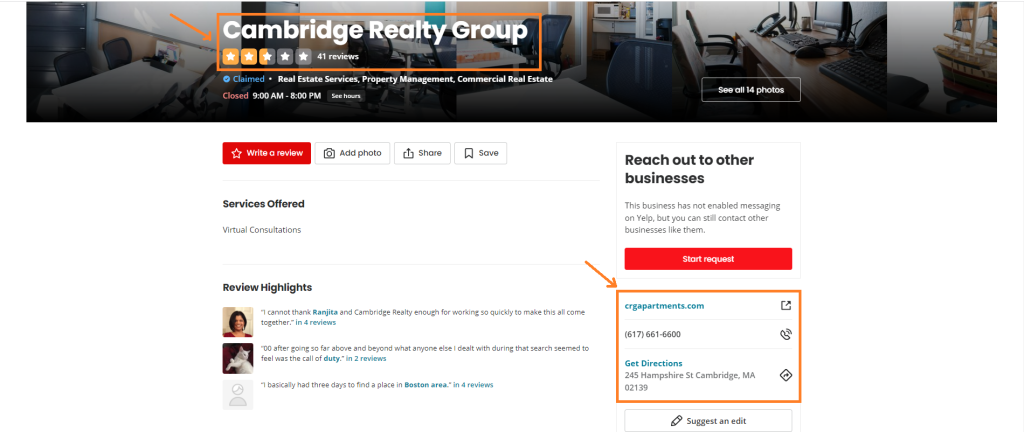
Getting local citations from relevant, trusted sources where people expect the business to be listed can have a positive impact on local search engine rankings. Business directories often dominate search results for local queries, so it’s useful to get listed on these sites. People often turn to sites like Yelp, Yellow Pages, and specialist directories to find local businesses.
There are two types of citations:
- Structured Citations: Structured citations list the name, address, and mobile number (NAP) of a business
- Unstructured Citations: They are contextual mentions of a business.
To build citations for a real estate business, it’s important to follow these four steps:
- Get listed with the ‘big three’ data aggregators: Acxiom, Infogroup, and Localeze are the ‘big three’ data aggregators that help to distribute business information to various directories and websites. Getting listed with these data aggregators can help ensure that the business information is consistent across the web.
- Submit to other core sites: Submitting to other core sites like Google My Business, Bing Places, and Yahoo Local can also help to improve local SEO.
- Submit to popular industry and local sites: Submitting to popular industry and local sites like Zillow, Trulia, and Realtor.com can help to improve visibility and credibility.
- Pursue unstructured citations: Pursuing unstructured citations like press mentions, blog posts, and forum posts can also help to improve local SEO.
According to a survey by BrightLocal, 91% of consumers read online reviews for local businesses, and 84% trust online reviews as much as personal recommendations. This highlights the importance of acquiring local citations and reviews for real estate businesses.
Below is a list of data aggregators and websites they should get citations from:
- Acxiom: Yelp, Yellow Pages, Citysearch
- Infogroup: Angie’s List, Foursquare, Superpages
- Localeze: Facebook, Apple Maps, MapQuest
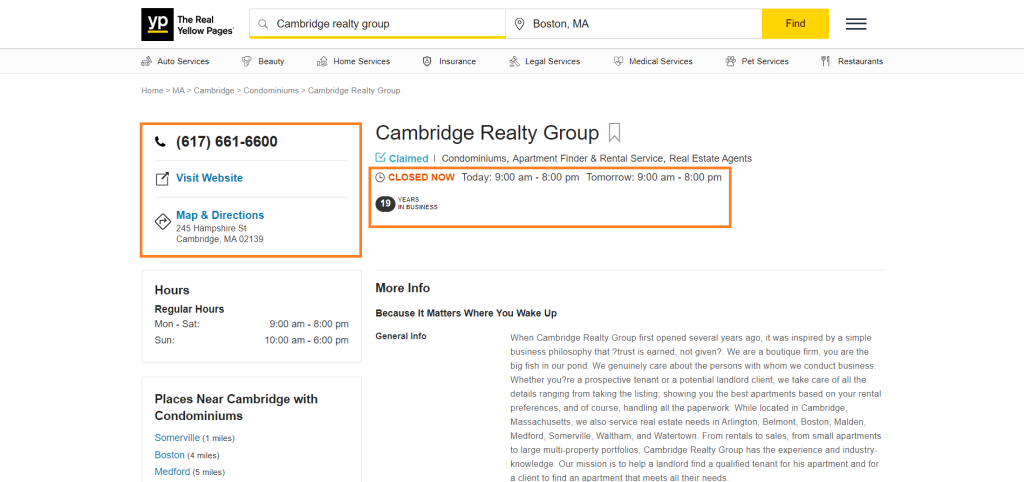
Step 9: Optimize page speed and website experience
It is crucial for realtors or estate agents to optimize their website’s page speed and user experience for better rankings in 2023. This is because Google has announced that it will be incorporating page experience signals as a ranking factor in its algorithm from 2021 onwards, which means that websites with better page speed and user experience will rank higher on search engine results pages.
To quickly optimize page speed and website experience, realtors or estate agents can use better and lighter themes like the real estate theme on Codecanyon, as well as plugins like Nitropack for WordPress. These tools can help to optimize various elements of the website, such as images, plugins, and hosting, to improve page speed and user experience.
Step 10: Track rankings Using Google Search Console
For a Realtor or Estate Agent business, connecting to Google Search Console and tracking the website ranking is crucial as it can help in identifying the areas that need improvement and finding new opportunities to attract potential clients. By interpreting the website ranking data, realtors can optimize their existing content, uncover new areas to create fresh content, and expose underperforming pages to improve or redirect them.
To interpret the website ranking data and take appropriate actions, realtors can use the following table:
| Goal | Action | Ranking Data |
| Optimize internal linking | Find pages that need a better internal linking layout to improve Pagerank | Pages with keywords in the top 4-14 positions |
| Find new opportunities to build topical authority | Uncover new areas and ideas to create fresh content that can easily rank | Pages with no ranking keywords in the top 20 positions that don’t align with the user’s search intent |
| Find underperforming pages | Expose underperforming pages and either improve them or redirect them | Pages with no ranking keywords in the top 20 positions that don’t align with the user’s search intent |
Step 11: Optimize your Realtor or Estate Agent’s Local Google My Business account
Google My Business is a free service that allows business owners to provide more information about their business when it appears in searches, including photos, videos, telephone numbers, business hours, and links to reservation services. To optimize a Realtor or Estate Agent’s business listing for local search, they can follow these practical steps:
- Claim and verify their business listing on Google My Business by creating a Google account and providing accurate and up-to-date information about their business, including their name, address, and phone number.
- Choose the right category for their business and write a concise and keyword-rich description of their services that will help potential clients find them when they search for real estate agents in their area.
- Add high-quality photos and videos of their properties and team members to showcase their expertise and professionalism, and encourage clients to leave positive reviews on their listings to improve their visibility and credibility.
- Use Google My Business Insights to track their listing’s performance and identify areas for improvement, such as updating their business hours or adding new services.
- Optimize their website for local search by including their business name, address, and phone number on every page, creating localized content that targets their specific audience, and building high-quality backlinks from local directories and industry websites.
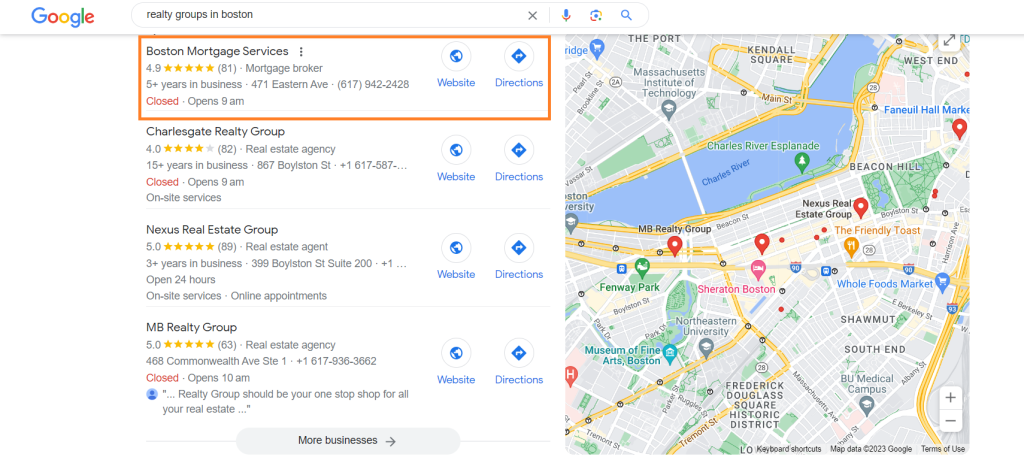
For example:
A real estate business can add photos and videos of their latest property listings to their Google My Business listing to showcase their expertise and attract potential clients. They can also encourage satisfied clients to leave positive reviews on their listings to improve their credibility and visibility in local search results. Additionally, they can optimize their website for local search by including their business name, address, and phone number on every page and creating localized content that targets specific neighborhoods or communities. Finally, they may want to consider hiring a digital marketing agency to ensure that their Google My Business listing and website are fully optimized for local search and to stay ahead of the competition.
Step 12: Invest in the right tools to set up the structure, create a process and optimize content
Investing in the right tools is crucial for realtors or estate agents who want to succeed with SEO. They streamline the entire SEO content strategy, including on-page optimization, by providing keyword research, content optimization, and performance tracking. This all-in-one SEO platform offers keyword suggestions, content optimization recommendations, and performance metrics that help optimize pages efficiently. This guide on writing SEO content offers useful tips for producing compelling and optimized material that can rank favorably on search engines.
It is also important for the real estate business to ensure they get the right team behind these efforts. Clear communication and collaboration between team members are essential for achieving goals and producing high-quality content. Establishing team alignment, setting clear goals, assigning specific responsibilities to each team member, holding them accountable for their assigned tasks, meeting deadlines, and producing high-quality work are all crucial. Regular check-ins and progress updates can help keep everyone on track to meet project milestones as planned. Good team alignment increases efficiency, produces better-quality content, and creates a more cohesive team. An SEO content optimization tool helps improve the content to rank better on search engines.
Step 13: Focus on the ultimate goal: leads/conversions
Most websites focus on organic traffic because it is a cost-effective way to attract potential clients and build brand awareness. However, focusing solely on traffic without considering leads and conversions can be counterproductive.
For example, a short-tailed keyword like “real estate” may bring in a lot of unrelated traffic, but a more specific keyword like “luxury homes in Beverly Hills” may attract a smaller but more targeted audience for realtors or estate agents.
It’s important to focus on leads and conversion rates because ultimately, the goal of a website is to convert visitors into paying clients. While traffic is important, it’s not the end goal. By focusing on leads and conversions, businesses can ensure that their website is optimized to attract and convert potential clients, leading to increased revenue and growth.
How to evaluate an agency to help with the SEO of your Realtor or Estate Agent business
Tips on SEO services
When evaluating an agency to help with an SEO guide for your real estate agency’s website, there are a few key factors to consider:
- Look for real-world experience: Choose an agency that has a minimum of 5 to 10 years of experience working with websites in the real estate industry. This will ensure that they have a better understanding of the competitive landscape and can be more creative and innovative in their approach to strategy design. Ask for examples of their work with other real estate clients and the results they achieved.
- Evaluate their process: A good SEO industry will employ a proven process and customized approach. Ask about their process and how they will tailor it to your specific needs. For example, at our agency, we perform an industry analysis, competitive research, strategy design, implementation, and follow-up for each client, but each strategy is unique to the client.
- Check for creativity and innovation: The best SEO agencies are highly creative and innovative. Ask the agency what creative strategies they’ve implemented to help their real estate clients stand out from the competition. For example, we’ve helped real estate clients create unique content that showcases their expertise and local knowledge, which has helped them rank higher in search results.
- Look for results: Ultimately, the most important factor is results. Ask the agency for examples of real estate clients they’ve helped achieve higher search rankings, increased website traffic, and ultimately, more leads and sales. For example, we helped a real estate client increase their website traffic by 200% and generate 50% more leads within six months of implementing our SEO strategy.
Contract duration and flexibility
When evaluating an agency to help with SEO for your real estate agency’s website, it’s important to consider contract durations and flexibility. Here are some tips to help you make the right choice:
- Look for an agency that offers flexible contract durations. A good SEO agency should be willing to work with you on a contract that fits your needs. For example, if you’re just starting out and need help getting your website off the ground, you may want to start with a shorter contract to see how things go. On the other hand, if you’re looking for ongoing support, a longer contract may be more appropriate.
- Consider the agency’s track record. Look for an agency that has experience working with real estate websites and has a proven track record of success. Ask for case studies or examples of other real estate websites they have worked on and the results they achieved.
- Ask about their approach to SEO. A good agency will have a proven process and customized approach, as well as be creative and innovative. Ask about their process for industry analysis, competitive research, strategy design, implementation, and follow-up. Make sure they tailor their approach to your specific needs and goals.
- Check for real-world SEO experience. Look for an agency with at least 5 to 10 years of real-world experience in SEO, preferably working with real estate websites. An agency with hands-on experience in your niche will have a better understanding of the competitive landscape and be more creative and innovative in its approach.
- Evaluate their communication and reporting. A good agency should be transparent and provide regular updates on its progress. Ask about their reporting process and how often you can expect to receive updates.
Need an SEO Strategist to set up the plan and answer all the pressing questions?
If you’re a real estate agent or broker, you know how important it is to have a strong online presence. With so many people turning to the internet to find homes and evaluate real estate professionals, it’s essential to have a website that ranks well in search engine results. However, mastering real estate SEO can be a daunting task, especially if you’re not familiar with the latest best practices and techniques. That’s why it’s a good idea to consider hiring an SEO consultant to help you develop a solid SEO plan before hiring an agency. An SEO manager can work with you to develop a strategy, plan, and execute it to ensure everything goes smoothly and you get the right results. With their expertise, you can rest assured that your website will rank well in search engine results and attract the right kind of traffic. So, if you’re serious about growing your real estate business, consider hiring an SEO consultant today.
In light of the considerable amount of people utilizing mobile devices to browse the internet, it is essential to ensure that your website is optimized for this user base. Implementing Mobile SEO techniques can facilitate easy accessibility and discoverability for your website by these users.
In light of the considerable amount of people utilizing mobile devices to browse the internet, it is essential to ensure that your website is optimized for this user base. Implementing Mobile SEO techniques can facilitate easy accessibility and discoverability for your website by these users.


